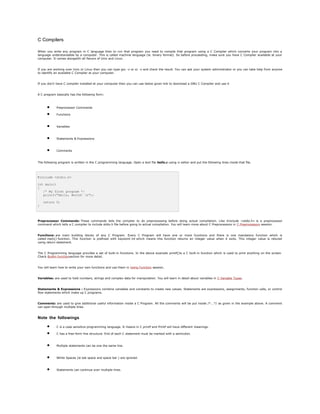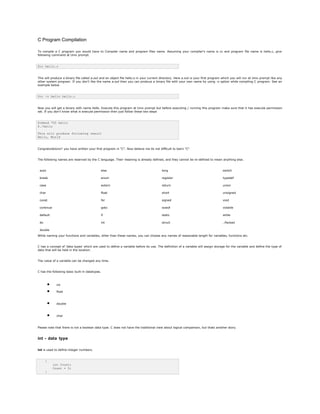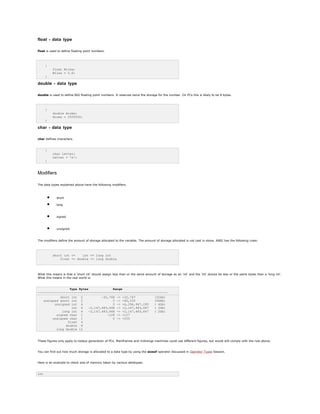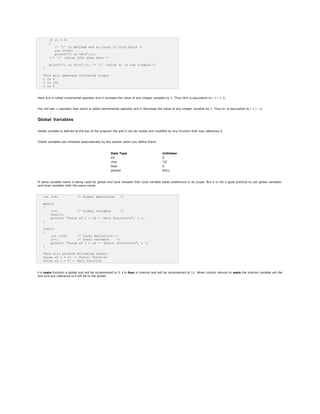C is a high-level programming language developed for the Unix operating system, known for its efficiency and versatility in system development. It allows for low-level programming and can compile on various platforms, making it a foundational language for many modern applications. The document covers core concepts including C syntax, data types, functions, arrays, and program compilation, serving as a beginner's guide to learning C programming.




![main()
{
printf("sizeof(char) == %dn", sizeof(char));
printf("sizeof(short) == %dn", sizeof(short));
printf("sizeof(int) == %dn", sizeof(int));
printf("sizeof(long) == %dn", sizeof(long));
printf("sizeof(float) == %dn", sizeof(float));
printf("sizeof(double) == %dn", sizeof(double));
printf("sizeof(long double) == %dn", sizeof(long double));
printf("sizeof(long long) == %dn", sizeof(long long));
return 0;
}
Qualifiers
A type qualifier is used to refine the declaration of a variable, a function, and parameters, by specifying whether:
• The value of a variable can be changed.
• The value of a variable must always be read from memory rather than from a register
Standard C language recognizes the following two qualifiers:
• const
• volatile
The const qualifier is used to tell C that the variable value can not change after initialisation.
const float pi=3.14159;
Now pi cannot be changed at a later time within the program.
Another way to define constants is with the #define preprocessor which has the advantage that it does not use any storage
The volatile qualifier declares a data type that can have its value changed in ways outside the control or detection of the compiler (such as a variable updated by the
system clock or by another program). This prevents the compiler from optimizing code referring to the object by storing the object's value in a register and re-reading
it from there, rather than from memory, where it may have changed. You will use this qualifier once you will become expert in "C". So for now just proceed.
What are Arrays:
We have seen all baisc data types. In C language it is possible to make arrays whose elements are basic types. Thus we can make an array of 10 integers with the
declaration.
int x[10];
The square brackets mean subscripting; parentheses are used only for function references. Array indexes begin at zero, so the elements of x are:
Thus Array are special type of variables which can be used to store multiple values of same data type. Those values are stored and accessed using subscript or index.
Arrays occupy consecutive memory slots in the computer's memory.
x[0], x[1], x[2], ..., x[9]
If an array has n elements, the largest subscript is n-1.
Multiple-dimension arrays are provided. The declaration and use look like:
int name[10] [20];
n = name[i+j] [1] + name[k] [2];
Subscripts can be arbitrary integer expressions. Multi-dimension arrays are stored by row so the rightmost subscript varies fastest. In above example name has 10
rows and 20 columns.](https://image.slidesharecdn.com/basicc-150326124224-conversion-gate01/85/Basic-c-5-320.jpg)
![Same way, arrays can be defined for any data type. Text is usually kept as an array of characters. By convention in C, the last character in a character array should be
a `0' because most programs that manipulate character arrays expect it. For example, printf uses the `0' to detect the end of a character array when printing it out
with a `%s'.
Here is a program which reads a line, stores it in a buffer, and prints its length (excluding the newline at the end).
main( ) {
int n, c;
char line[100];
n = 0;
while( (c=getchar( )) != 'n' ) {
if( n < 100 )
line[n] = c;
n++;
}
printf("length = %dn", n);
}
Array Initialization
• As with other declarations, array declarations can include an optional initialization
• Scalar variables are initialized with a single value
• Arrays are initialized with a list of values
• The list is enclosed in curly braces
int array [8] = {2, 4, 6, 8, 10, 12, 14, 16};
The number of initializers cannot be more than the number of elements in the array but it can be less in which case, the remaining elements are initialized to 0.if you
like, the array size can be inferred from the number of initializers by leaving the square brackets empty so these are identical declarations:
int array1 [8] = {2, 4, 6, 8, 10, 12, 14, 16};
int array2 [] = {2, 4, 6, 8, 10, 12, 14, 16};
An array of characters ie string can be initialized as follows:
char string[10] = "Hello";
A variable is just a named area of storage that can hold a single value (numeric or character). The C language demands that you declare the name of each variable that
you are going to use and its type, or class, before you actually try to do anything with it.
The Programming language C has two main variable types
• Local Variables
• Global Variables
Local Variables
• Local variables scope is confined within the block or function where it is defined. Local variables must always be defined at the top of a block.
• When a local variable is defined - it is not initalised by the system, you must initalise it yourself.
• When execution of the block starts the variable is available, and when the block ends the variable 'dies'.
Check following example's output
main()
{
int i=4;
int j=10;
i++;
if (j > 0)
{
/* i defined in 'main' can be seen */
printf("i is %dn",i);
}](https://image.slidesharecdn.com/basicc-150326124224-conversion-gate01/85/Basic-c-6-320.jpg)
